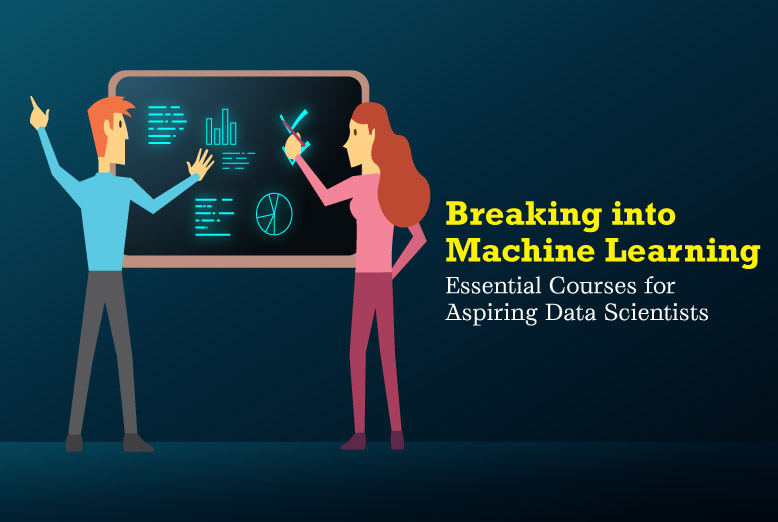In the dynamic realm of technology, machine learning has emerged as a transformative force, revolutionising industries and reshaping the landscape of data science. Aspiring data scientists seeking to break into the field recognize the importance of acquiring a solid foundation through machine learning courses. This article delves into the essential courses for individuals aspiring to become data scientists, exploring the significance of machine learning masters programs and the comprehensive nature of data science and machine learning courses.
Machine Learning Masters Programs: A Deep Dive into Advanced Concepts:
For those aiming to delve deep into the intricacies of machine learning, enrolling in machine learning masters programs is a strategic move. These programs are designed to provide a comprehensive and advanced understanding of machine learning principles, algorithms, and applications. Typically offered by renowned institutions, these master’s programs cover a broad spectrum of topics, from supervised and unsupervised learning to deep learning and reinforcement learning.
Machine learning masters programs often require a strong background in mathematics, statistics, and programming. However, the rewards are significant, as graduates emerge with a thorough understanding of cutting-edge techniques and methodologies. The depth of knowledge gained through these programs positions individuals for roles that demand a profound expertise in machine learning.
Key Components of Machine Learning Masters Programs:
- Advanced Statistical Modeling: Machine learning masters programs often include modules on advanced statistical modelling. These modules delve into the mathematical foundations of machine learning algorithms, ensuring students grasp the underlying principles. Understanding statistical concepts is crucial for data scientists as they interpret complex patterns and make informed decisions based on data.
- Deep Learning and Neural Networks: The rise of deep learning has been a game-changer in machine learning. Machine learning masters programs delve into the world of neural networks, teaching students how to design, train, and optimise deep learning models. This knowledge is particularly valuable in applications such as image recognition, natural language processing, and autonomous systems.
- Reinforcement Learning: Reinforcement learning, a subset of machine learning, focuses on training models to make decisions through trial and error. Machine learning masters programs often cover reinforcement learning techniques, preparing individuals for roles where decision-making under uncertainty is a critical skill.
- Practical Applications and Capstone Projects: Machine learning masters programs are renowned for their practical orientation. Many programs culminate in capstone projects, allowing students to apply their theoretical knowledge to real-world problems. This hands-on experience not only solidifies their understanding but also provides a portfolio of work that showcases their ability to tackle complex challenges.
Data Science and Machine Learning Courses: A Holistic Approach
While machine learning masters programs offer an in-depth exploration of advanced concepts, comprehensive data science and machine learning courses provide a more holistic approach. These courses cater to individuals at various skill levels, making them accessible to beginners while offering advanced topics for those with prior experience.
- Foundational Concepts in Data Science:Data science and machine learning courses typically start with foundational concepts, covering statistics, data wrangling, and exploratory data analysis. These courses are ideal for individuals looking to build a strong base before diving into the intricacies of machine learning.
- Machine Learning Algorithms and Models: These courses progress to cover machine learning algorithms, both classical and contemporary. From linear regression to ensemble methods, participants gain a thorough understanding of various models and their applications. The goal is to equip individuals with the skills needed to select, train, and evaluate machine learning models effectively.
- Hands-On Programming and Tools: Proficiency in programming languages such as Python and R is paramount for data scientists. Data science and machine learning courses often integrate hands-on programming exercises, ensuring participants develop the practical skills needed for real-world applications. Additionally, these courses introduce participants to popular tools and libraries such as scikit-learn, TensorFlow, and PyTorch.
- Ethical and Business Considerations: Beyond technical skills, data science and machine learning courses recognize the importance of ethical considerations and business acumen. Participants learn to navigate ethical challenges in data science, considering issues such as bias, privacy, and transparency. Moreover, courses often include modules on communicating findings effectively to stakeholders, emphasising the business impact of data-driven insights.
Flexibility and Accessibility of Data Science and Machine Learning Courses:
One notable advantage of data science and machine learning courses is their flexibility and accessibility. Many reputable platforms offer these courses online, allowing individuals to learn at their own pace. This accessibility democratises education, enabling aspiring data scientists from diverse backgrounds to acquire valuable skills without geographical constraints.
Data science and machine learning courses cater to professionals looking to upskill or make a career transition. Whether participants are full-time students, working professionals, or career changers, these courses provide the flexibility needed to accommodate various schedules and commitments.
Choosing the Right Path: Master’s Programs vs. Comprehensive Courses:
The choice between pursuing a machine learning masters program or a comprehensive data science and machine learning course depends on individual goals, prior experience, and time commitment. Master’s programs offer a deep dive into advanced concepts and are well-suited for those seeking specialised roles in research or senior-level positions.
On the other hand, comprehensive courses are designed to cater to a broader audience. They are suitable for beginners looking to enter the field or professionals seeking to enhance their skills for practical applications. The flexibility and accessibility of these courses make them an attractive option for those balancing work and learning.
Conclusion:
In the competitive landscape of data science and machine learning, both machine learning masters programs and comprehensive courses play vital roles in shaping the future of aspiring data scientists. While master’s programs offer depth and specialisation, comprehensive courses provide a more accessible entry point for individuals at various stages of their careers.
Ultimately, the success of breaking into machine learning lies in the alignment of educational choices with individual goals and aspirations. Whether aspiring data scientists choose the rigour of a master’s program or the flexibility of comprehensive courses, the key is to embark on a learning journey that equips them with the knowledge and skills needed to thrive in the ever-evolving field of data science and machine learning.















